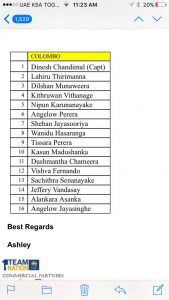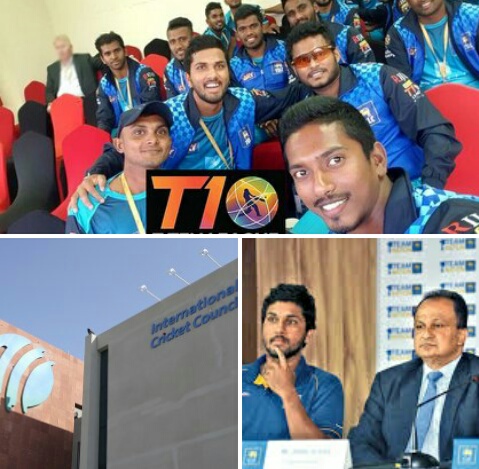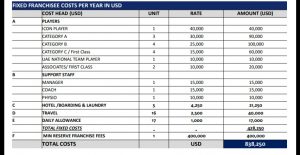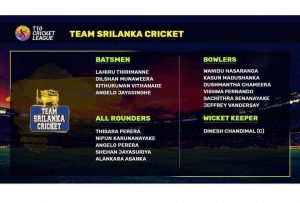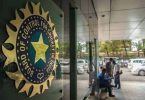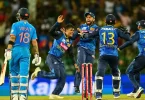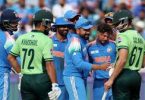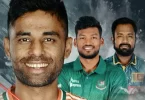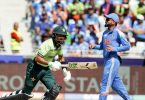The International Cricket Council (ICC) has certainly Two big weaknesses in its functioning: first it prefers to catch only small fishes in its so called ‘corruption and match fixing free game‘ initiative and second the governing body is completely blindfolded over dozens of suspicious leagues, being played around the world these days. Now, as the so called Anti corruption unit has set its sight on Sri Lanka cricket’s involvement in Dubai T10 league, it’s officials are again focusing only on small fishes. The big questions, like – how Sri Lanka Cricket Board (SLC) CEO Ashley De Silva had manipulated things, negotiated with T10 organisers, included players on his wish and distributed only peanuts from the league money to players who participated – are still unanswered. ICC needs to investigate Ashley’s involvement in the league properly, only then the truth of the corruption and possible match fixing will come out!
On May 9, ICC, on behalf of the Emirates Cricket Board (ECB), charged Two former Sri Lanka players Nuwan Zoysa for breaching four counts of the ECB Anti-Corruption Code for Participants for the T10 League (the ‘Code’) and Avishka Gunawardene for two counts. The charges relate to the T10 League played in the UAE in December 2017.
Both they have been charged with the following offences under the Code:
Nuwan Zoysa:
Article 2.1.1 – for being party to an agreement to influence improperly the result, progress, conduct or other aspect(s) of a match.
Article 2.1.4 – Directly or indirectly soliciting, inducing, enticing, instructing, persuading, encouraging or intentionally facilitating any Participant to breach Code Article 2.1.
Article 2.4.4 – Failing to disclose to the ACU full details of any approaches or invitations received to engage in corrupt conduct under the Code.
Article 2.4.6 – Failing or refusing, without compelling justification to cooperate with any investigation carried out by the ACU in relation to possible Corrupt Conduct.
Avishka Gunawardene:
Article 2.1.4 – Directly or indirectly soliciting, inducing, enticing, instructing, persuading, encouraging or intentionally facilitating any Participant to breach Code Article 2.1.
Article 2.4.5 – Failing to disclose to the ACU (without unnecessary delay) full details of any incident, fact, or matter that comes to the attention of a Participant that may evidence Corrupt Conduct under the Anti-Corruption Code by another Participant.
Questions Over ICC Charges
However, first and foremost, the investigation and charging players by ICC itself raises several questions. The most burning question is that why ICC took more than one and half year to charge players?
Cricket Age reliably learns that according to the constitution of Emirates Cricket Board (ECB), if suspicions activities, corruption or match fixing comes to the knowledge, it must be reported within 180 days. In this case, ICC has charged players after one and half year.
The legality of T10 league
1. The T10 league was sanctioned by the ECB in accordance with the ICC’s event sanctioning regulations in force at the time which gave the ECB the exclusive right to sanction such an event.
2. The ICC had no role in assigning and contracting the umpires and match referees, instead, they were assigned and contracted by the organizer and/or the ECB.
3. The ICC was contracted to provide anti corruption services to the league and, as such, members of the ICC’s anti corruption unit delivered education and were present during the event.
As the 3rd points suggests that the ICC was playing the role similar to a security agency only, which were hired by ECB for the T10 league. In this scenario, ICC needs to clarify, whether it has the authority to charges Sri Lanka former players? Ideally, the ECB should have acted and charged them not the ICC?
Ashley De Silva’s Suspicious involvement
Ashley, the most notorious and controversial official of SLC, had single handedly negotiateated with the T10 organisers and made all the arrangements to send the Sri Lanka team to participate.
As, it’s always the case with Ashley, there were plenty of suspicious incidents happened before, during and after the league.
During and after the T10 league in 2017, Cricket Age had published several stories about Ashley’s wrongdoings with documents. Cricket Age still has the access of all the documents and proofs that proves following facts:
1. Led by Dinesh Chandimal, the team had comprised members of the Western province team that won that 2017 inter province tournament. However, several players who were not in the Western Province team had also been added. Most notably, Angelo Jayasinghe and Leo Fransisco, who were part of winning provincial side, we’re left out and instead an ordinary and controversial allrounder Ramith Rambukwella was included in the squad even though he had played for Dambula Provincial.
2. The most shocking fact is that the national selection committee had been unaware of selections and changes. Then chief selector Graeme Labrooy was not involved in the selection of the team for the T10 league. Instead, it was Ashley, who made changes into the squad by including Rambukwella.
3. After the league, players of other participating teams were paid at the rate of 15,000 US Dollars (Rs. 2.5 million) per non-national player and 40,000 US Dollars for icon player. However, members of Team Sri Lanka were paid Rs. 75,000 each only.
4. The team’s sponsor had said that it has paid all the dues to SLC, but players never received rest of their money.
And, these facts raises several questions, like:
1. Why, and on whom instructions, Ashley De Silva included Ramith Rambukwella into the squad?
2. Why then Sri Lanka national selection committee were not allowed, consulted for selecting and changing the team?
3. Why players, that participated in the league under SLC, we’re paid only token amounts?
4. Where is the rest of the money?
Ashley has always been a controversial official. Two years ago, he had ordered the entire team to fly to India, even though then Sports Minister was yet to approve the squad. Then, once he announced that the SLC is mulling over to change the captains for each tour and series. ICC needs to properly investigate the involvement of Ashley, if the governing body wants to justify its fight against corruption in Sri Lanka! Before all this, though, the ICC needs to clarify whether it has the authority to investigate by its own in the ECB matter?
